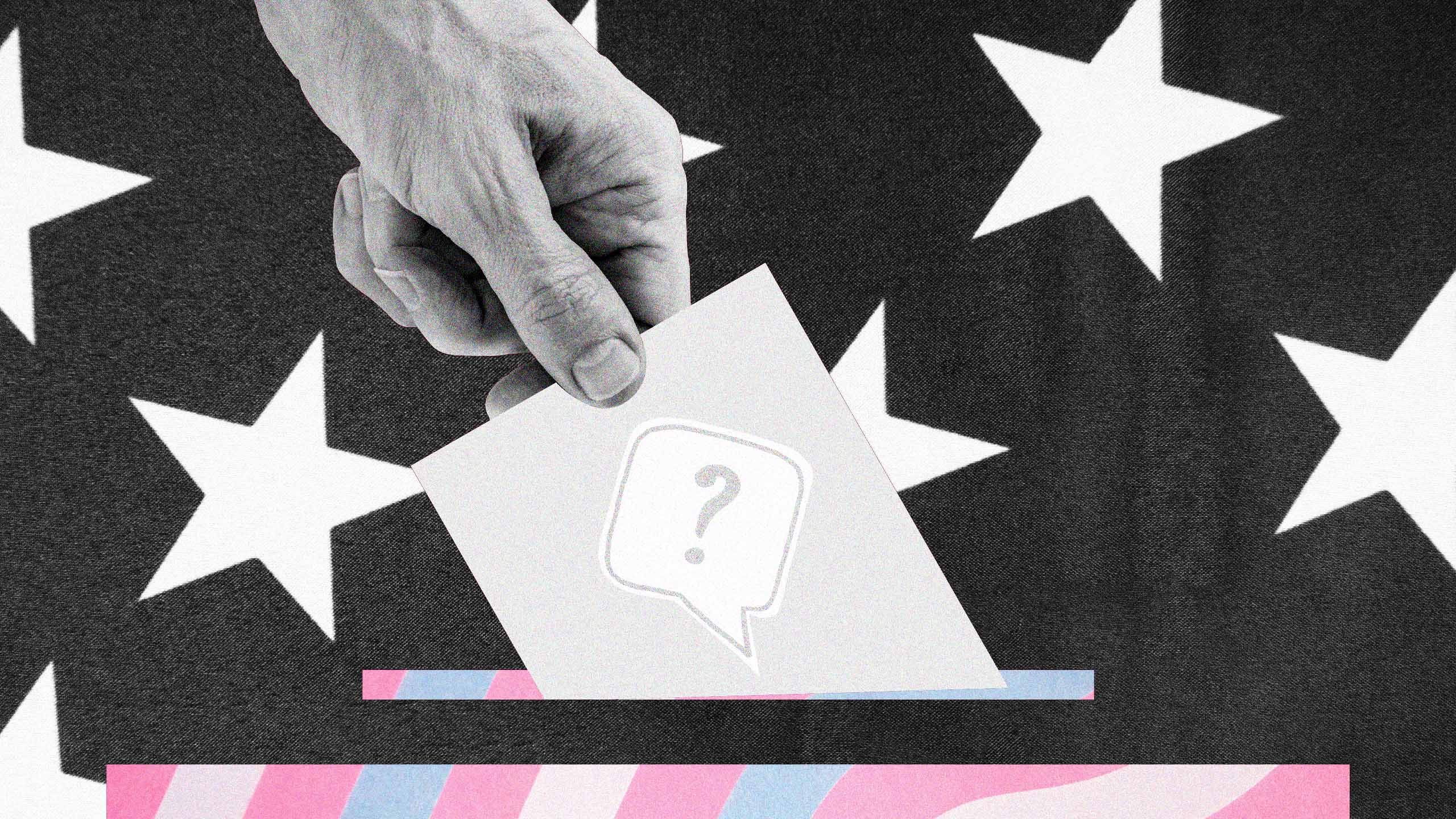I have spent most of the past year trying not to think about the U.S. presidential election. This is a big change for me; I have covered the past few elections. The story of 2024—an election that revolves, even more than usual, around questions of gender—ought to be right up my alley. Then again: this is the first presidential election since I transitioned. When I wake up and check the news now, I don’t respond with excitement or hot takes. Now, what I feel is dread.
The dread and stress of this election are hardly unique to me. A recent survey by FOLX Health, a platform that connects LGBTQ+ patients to healthcare providers, finds that 92 percent of trans people are anxious about the election, and 66 percent report experiencing “frequent mental distress” in the past month. This figure has doubled since 2021, when only 33 percent of trans adults and 15 percent of cis adults reported frequent mental distress. Previous research suggests that the presidential elections of 2020 and 2016 also had measurable impacts on trans mental health. In 2020, trans people’s “coping and resilience” rebounded once the election was over. In 2016 … well, not so much.
Things have gotten objectively much worse for trans people since 2020. Transphobia was not exactly unheard of four years ago, but for the entirety of the Biden administration, trans people have been pelted with rhetoric and legislation intended to dehumanize, persecute and degrade them. The phenomenon is called “minority stress”—the chronic low-level (and high-level) trauma of being discriminated against, which tends to lead to worse mental health outcomes in marginalized communities, as well as higher rates of physical stress-related diseases.
So we know what is happening. We need to know what to do. Though it would be silly to reduce something as consequential as a presidential election to “self care,” even the worst situations can be made worse by losing your shit. If you are feeling the stress of this election, it is in your best interest to find a way of surviving it. Here, to the best of my ability, is a guide to keeping it together until November.
The stress isn’t crazy
The fact that trans people are especially stressed out does not indicate that they’re imagining things or being “emotional.” In the FOLX survey, most respondents had extremely practical concerns: nine in 10 respondents believed that the election “will have a major impact on access to healthcare for LGBTQ2S+ people nationwide,” which it will. Sixty-seven percent were making changes to their transition plans in advance of expected healthcare bans, such as moving up the dates for surgical procedures or stockpiling HRT.
Voters in trans-hostile states were, unsurprisingly, more likely to be changing their healthcare plans and more likely to be worried about the impact of the election on healthcare. They were also more likely to be planning a move: 78 percent of trans residents in states with “negative policy environments” had considered moving in the past year. (Fun fact: moving house is estimated by many people to be more stressful than getting a divorce.) This isn’t a bad reaction, or an “emotional” reaction—it’s a smart, productive, realistic reaction to a situation they should never have had to endure in the first place.
Bluntly: it’s not crazy to be really freaked out right now, and you shouldn’t blame yourself if you are. You are having a proportionate response to real, large, scary things that are happening in the world around you. It is the quality of the support and witnessing you receive that determines how well you weather this. Begin by witnessing yourself.
Therapy helps—if you can get it
Parker Molloy is a trans woman who has covered electoral politics and the political media on a daily basis for over a decade. It is a job that requires immersing herself face-first in a stream of hatred, and it takes a toll—she has told me point blank, in previous interviews, that she has a hard time feeling hopeful about the future.
“The constant flood of anti-trans rhetoric, legislation and online hate feels suffocating,” she says. “In past years, I’ve been able to step back a bit, detach and protect my mental health by limiting my exposure to the endless stream of negativity, but it feels like this year has been particularly overwhelming.”
Molloy also—like me; unlike many trans people—has the ability to access mental healthcare when she needs it. Minority stress is particularly harmful to groups who are unable to access support. For example, “mental distress” is highest among young trans people: 74 percent of trans people aged 25 to 34 and 76 percent among trans people 18 to 25 reported it. Significantly, these same demographics were the least likely to access mental healthcare: 56 percent of 25-to-34-year-olds and 65 percent of 18-to-24-year-olds were unable to get care, the most common reason being their inability to afford it.
The second-most common reason was the inability to find trans-competent practitioners. It doesn’t really help to get therapy if your therapist is going to undermine or attack you the whole way through. This is a well-known problem for trans people—a 2021 survey from the Center for American Progress found that 47 percent of all trans respondents, and 68 percent of trans respondents of colour, had experienced at least one form of discrimination from a healthcare provider. The vast majority of therapists and psychiatrists simply aren’t trained on how to treat trans people, and those who are frequently don’t take insurance because “rates negotiated through insurance companies are too expensive for small providers.” The result is that one of the populations most likely to need mental healthcare (and most likely to seek it—in 2020, The Trevor Project found that trans youth are slightly more likely than cis youth to receive therapy, even though more than half of those who sought out mental healthcare didn’t get it) also have the worst chances of getting the care they need.
Access to mental healthcare does make a real difference in people’s ability to manage stress— and it makes a difference whether the external circumstances change or not. Molloy found dialectical behavioral therapy and acceptance and commitment therapy to be particularly helpful; as for me, trauma therapy has made me feel safer in my day-to-day interactions, and hence less likely to be overwhelmed. Get the therapy if you can, if it’s a realistic option—but it may not be a realistic option for that many people. Which means we have to lean on one another.
Please don’t tell people to “just vote”
Here is a piece of trivia worth knowing: 90 percent of the trans respondents to the FOLX survey were registered to vote. By contrast, only about 66 percent of the eligible U.S. population turned up to vote in 2020, which was a historically high percentage—the highest since 1900, in fact.
Trans people are remarkably engaged and politically committed—including a commitment to electoral politics. However, that commitment does not translate into a unilateral love of the Democratic candidates. Only 28 percent thought Harris “very much” addressed the concerns of LGBTQ2S+ communities, and the number was lower for Biden. Again: they were overwhelmingly planning to vote. They were overwhelmingly not planning to vote for Trump. But that doesn’t translate to being happy: after all, the avalanche of anti-trans legislation that’s causing all this stress happened under Biden.
In the absence of professional support and mental healthcare, our best bet is to support one another. Many of the people reading this will be trans, but many of you won’t be, and you’ll have to deal with hearing trans people process their electoral stress. They may express everything from enthusiasm to ambivalence to anger, and all of it is okay. There are a wide range of appropriate emotional responses to persecution, and one of them is frustration that the people on “your side” aren’t doing enough to help.
The fact is that there simply are not enough trans people in the country to shift the election all on our own. We are still only a little over one percent of the population; even if we all voted, even if we all voted for the same candidate, we could not single-handedly effect either a Trump loss or a Harris victory. Telling people to “just vote” can feel like being practical, but you’re also reminding them just how little power they have.
That’s the difference between being an ordinary voter and being a human wedge issue: some of us are deciding what to eat, and some of us are on the menu. Telling that second set of people to grin and bear it does very little to assuage their anger, sorrow or fear.
Obviously, each of us has the ability (and responsibility!) to control our own stress level. Even small acts of reclaimed agency—like putting a hard boundary on how much bad news you consume—can have radical effects. My mental health got much better when I deleted social media from my phone. I still spend a lot of time there, but only when I’m at my desk. The difference is that I can physically create space between myself and the nightmare story of the day. Trauma arises from powerlessness, and I cannot be overpowered by something that can’t even follow me down the hall into the bathroom.
But the most important thing we can do is to witness one another. Doubt and fear and powerlessness are all totally normal, given the situation—but you are not alone in them, and they are not your fault. Find spaces to support your trans friends and talk about all this. Find spaces to support your trans friends and not talk about all this. Find your people. Hold on. Only a few more weeks to go.


 Why you can trust Xtra
Why you can trust Xtra


